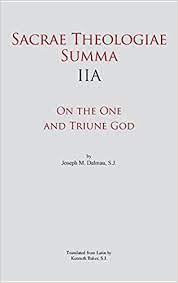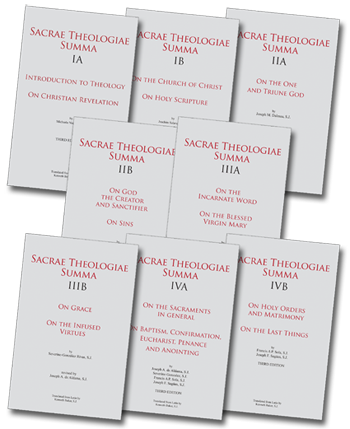A scene from The Canterbury Psalter (12th century)
Blog
On the Twofold, as they say, Trinitarian Theology (Latin and Greek)

There is a brief appendix in Joseph Dalmau’s On the One and Triune God (1955), entitled “On the Twofold, as they say, Trinitarian Theology—Latin and Greek.” Dalmau begins, “today…there is a widespread opinion that there is a twofold trinitarian theology’, Greek and Latin. …It will be worth the effort to consider this matter and to evaluate the main foundations of this opinion.” Dalmau identifies Théodore de Regnon as the most influential proponent of this view, whose main points he summarizes thus: Nature vs. Person:
The former [the Latins] consider the nature first, afterwards the person; on the contrary, the Greeks fix their attention on the person first, afterwards on the nature; that is, the Latins consider the nature directly and the person indirectly, while the Greeks consider the person directly and the nature indirectly. For the Latins a person is “personified nature”; for the Greeks a person is “a subject possessing a nature.” Therefore for the Latins the Trinity is one nature subsisting in three persons; but for the Greeks the Trinity is three persons who have the same nature. Now what is proper to nature is to act, but to the person to have and to communicate; therefore the Latins think of the divine processions as activities of the divine nature, but the Greeks think of them as communications of the substance. Therefore the Latins were inclined to search for the reason of the processions in the divine nature and in its immanent activities; here we find the origin of the psychological theory about the divine processions, started by St. Augustine and brought to perfection through S. Anselm by St. Thomas. Among the Greeks however none of this is found and the processions are not thought of as activities of the nature but as donations: The first person, the Father, gives his nature to the Son and through the Son to the Holy Spirit. (490)
Next, starting points for the doctrine:
Another essential difference between the two theologies presents itself: in the Latin theology the unity of the nature is something known before the processions; in Greek theology it is something resulting from the processions, in which one had to strive to avoid the danger of tritheism or subordinationism by a developed concept of circumincession. (491)
And then, appropriations and operations ad extra:
Finally, in reference to ad extra activities the Latins hold such a strict unity of the whole acting Trinity that they reduce the diversity of attributions, which occur in the sources, to a mere appropriation; in contrast, according to the Greeks the individual persons act in a way proper to themselves, which cannot be reduced to an appropriation. (491)
Dalmau summarizes the contrasts:
Unless we are mistaken, these are the substantial and main differences, presented by these authors, between the Latin and Greek theologies concerning the mystery of the Trinity. Both theories, according to them, offer excellent results, but neither one is perfect; they adhere to the Greek one rather than to the Latin, in which two points seem to displease them especially: the psychological explanation of the processions and the teaching about the appropriations, which they say are completely unknown to the Greeks. (491)
One thing I just want to point out before going further is that Dalmau is a very conservative Jesuit writing in the early 1950s (fuller bibliographical info below). That’s before most of what we would call the twentieth-century revival of trinitarian theology. It’s more than a decade before Rahner’s seminal essay (published as his book The Trinity). Though they overlapped significantly (Dalmau quotes at least one Rahner article in his book), Dalmau belongs to an earlier generation, and was in the business of producing that “manual theology” that Rahner and his generation drew on but wanted to break through and move beyond. In the preface of the 2016 English translation of Dalmau, the translator says that as a teacher, Rahner had Dalmau’s book on his desk and made frequent reference to it (it helps to remember that Rahner was both an encyclopedic master of the tradition and also a speculative theologian with his own post-Heidegerrian transcendental Thomist thing going on; he didn’t simply scrap the former when he operated as the latter).
Anyway, this chronology is worth noticing because a particularly stubborn version of this East-vs-West “two trinitarian theologies” schema really took hold of theological education in the sixties. It’s just everywhere, especially in brief introductions and seminaries. An exaggerated East-West split apparently made for good intro lectures; it was a teaching schema that seemed to help students get a grip on the breadth of Trinitarianism. It also set up Eastern Orthodoxy to function ecumenically as a strong contrast to all things Western, so it could speak with an exotic voice from beyond; this was in turn apparently a useful technique for leveraging some Greek patristics into the contemporary discussion. So its helpful to remember that good old-fashioned conservatives (I want to say hard-headed Vatican I types, but I don’t want to bias your possible reading) like Dalmau had identified the schema already in the 1950s, flagged it as a novelty, and mounted arguments against it.
Here are the key excerpts from Dalmau’s arguments. On the role of the divine nature in Greek patristic theology:
First of all, it must be said to be completely false that the unity of the divine nature was not for the Greek Fathers something presupposed by every trinitarian speculation, as is evident from the quoted texts themselves of the Greeks (for the Father communicates to the Son no other nature than the unique divine nature). Since also in revelation, as is known, the unity of God was clearly proposed before the distinction of the persons, and by the use of natural reason, which necessarily precedes the knowledge of revelation, God was known as one in nature, not as triune in persons.
On nature and person:
The Latins do not readily concede that they consider the nature directly and the person indirectly, since among all of them the suppositum or person is that which acts, but the nature is that by which it acts. With regard to the Trinity, however, both for the Latins and the Greeks, as I think, it is both “one nature subsisting in three persons,” and “three persons having the same nature”; therefore the claimed difference between them is fictitious.
Dalmau admits that different regional traditions developed in response to various regional issues, but warns that there’s no reason to ramify this out into two fundamentally different trinitarianisms:
Finally, therefore, lest we deny that the Greek and Latin theologies present a somewhat different face, just as different points are also found between the Latins and the Greeks, especially by reason of the questions that they had to deal with, and by reason of the different level of scientific elaboration, we think it is certain that they in no way offer substantially different theological explanations.
It’s a 500-page book, so there are plenty of places you could check to see whether he handles Greek and Latin voices fairly. Dalmau’s as hard-nosed as you’d expect on the filioque, and freely admits important differences in specific truth claims in the ninth century. He’s not the kind of harmonizer S.J. who thinks everybody basically agrees with Rome if they’d just think straight. He just refuses to see discreet theological differences as indicators that two different systems stand over against each other.

Dalmau’s book is one volume in the Sacrae Theologiae Summa, a multi-author, multi-volume course by the Spanish Jesuits ( Patres Societatis Iesu Facultatum Theologicarum in Hispania); sometimes referred to as the BAC, the Biblioteca de Autores Cristianos (long available in Spanish and readable online in that translation). The whole set has, somewhat surprisingly, been translated into English within the last few years (Dalmau’s in 2016). I’ve only read this one volume (and of course the other volumes will include some doctrinal topics which will be less directly helpful to me as a Protestant than this sturdy Trinity volume is).
About This Blog

Fred Sanders is a theologian who tried to specialize in the doctrine of the Trinity, but found that everything in Christian life and thought is connected to the triune God.


